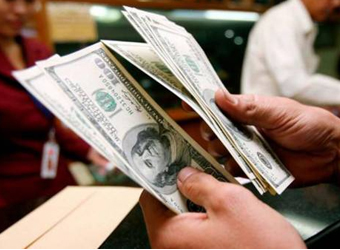The dollar stood near a four-week high against a basket of currencies on Wednesday after strong U.S. wholesale price figures kept the Federal Reserve on track for a widely-expected rate rise this week and more in 2018.
The dollar index stood at 94.071, having risen to 94.219 on Tuesday, its highest level since Nov. 14.
Against the yen, the dollar fetched 113.55 yen, having risen to a four-week high of 113.75 yen on Tuesday. The euro traded at $1.1737, having slipped to $1.17175 the previous day, which was its lowest level in three weeks.
The Fed is almost unanimously expected to raise its interest rates target by 0.25 percentage point at the end of its two-day policy setting meeting on Wednesday.
Investors are focusing more on the Fed’s projection on the pace of its rate hikes next year and policymakers’ view on the outlook for inflation.
The Fed will announce its decision on rates at 1900 GMT Wednesday followed by a statement. Chair Janet Yellen will hold a news conference at 1930 GMT.
While Fed policy makers’ projection in September suggested they expected three rate hikes in 2018, markets are pricing in only two, with many investors expecting tame inflation will lead to a slower tightening path.
“Although price trend seem to be picking up, it is not clear if that is enough to convince dovish members of the Fed on the need to be concerned about inflation,” said Shinichiro Kadota, senior strategist at Barclays.
U.S. producer price data for November showed 0.4 percent increase in wholesale inflation from the previous month.
From a year ago, the producer price index shot up 3.1 percent, the biggestgain since January 2012 and followed a 2.8 percent rise in October.
If U.S. consumer price data due at 1330 GMT on Wednesday also shows a similar uptick, that could fuel expectation of faster Fed rate hikes, analysts said.
Traders are also looking to Senate election in Alabama, where Republican Roy Moore, facing allegations of sexual misconduct, is battling a former U.S. Attorney Doug Jones, 63, who hopes to pull off an upset victory in the deeply conservative Southern state.
A Jones victory is seen as negative for the dollar and U.S. stocks as it would narrow the Republicans’ already slim majority in the U.S. Senate, possibly making it harder for Trump to advance his policy agenda including big tax cuts.
Elsewhere, the British pound hovered at $1.3315, near two-week lows of $1.3303 touched on Tuesday, although the currency was briefly propped up by data showing British inflation unexpectedly hit a near six-year high in November.
Consumer price inflation rose to an annual rate of 3.1 percent in November, above economists’ average expectations of 3.0 percent rise.
As that is more than a percentage point above the Bank of England’s 2 percent target, Governor Mark Carney will have to explain to finance minister Philip Hammond what the BoE is doing in response.
But because one of the main reasons behind the surge in inflation has been the pound’s plunge since last June’s vote for Brexit – about 12 percent on a trade-weighted basis – the BoE has said it expects it to come off slowly over the next three years to just above 2 percent as sterling steadies.
There was no notable change in market expectations on the BoE’s policy outlook, with sterling overnight indexed swaps pricing in a very small chance of a rate hike within the next six months. Source: Reuters
Source: Reuters
